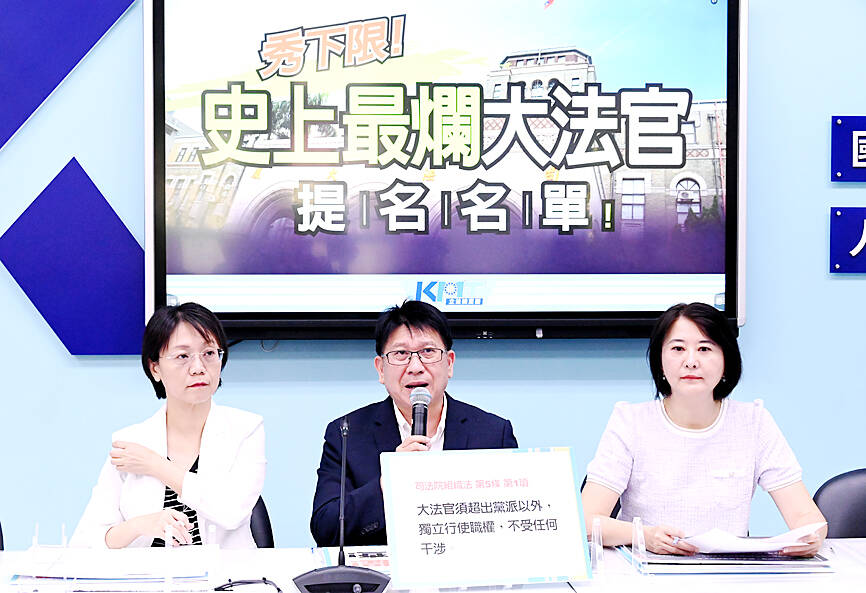The Chinese Nationalist Party (KMT) yesterday criticized President William Lai (賴清德) over his appointees to the Judicial Yuan, saying they were politically motivated.
Vice President Hsiao Bi-khim (蕭美琴) on Friday announced the president’s picks to lead the judicial branch and fill openings on the Constitutional Court after the president, vice president and five justices step down on Oct. 31.
National Taiwan University law professor Chang Wen-chen (張文貞) was named to lead the branch, while Yao Li-ming (姚立明), director of Lai’s presidential campaign headquarters in January’s election, was tapped for the vice presidency.

Photo: Chu Pei-hsiung, Taipei Times
The appointees must be confirmed by the legislature.
At a news conference yesterday, the KMT caucus said all the nominees are affiliated with the Democratic Progressive Party (DPP).
Chang last month argued to the Constitutional Court that the process by which controversial legislative reform bills were passed earlier this year contained “manifest and gross procedural flaws” and should be ruled unconstitutional.
Meanwhile, Yao’s “only achievement” was leading Lai to electoral victory in January, the KMT said.
Yao from 1996 to 1999 served as a lawmaker with the New Party, a KMT splinter party favoring closer ties with China, and was the campaign head for Taiwan People’s Party Chairman Ko Wen-je (柯文哲) when he ran as an independent for Taipei mayor in 2014.
Lai chose “henchmen” rather than justices who are looking to uphold the Constitution, the caucus said, adding that it cannot accept the nominations.
Taiwanese are worried about the neutrality of the judiciary, especially the Constitutional Court, KMT caucus secretary-general Lin Szu-ming (林思銘) said.
One of the nominees to the court — Academia Sinica professor Fort Liao (廖福特) — is a member of the DPP’s arbitration committee and was an expert witness against renewing CTi News’ license, Lin said.
Another justice nominee — Academia Sinica research professor Liu Ching-yi (劉靜怡) — was an expert witness on the DPP’s side in a case on the constitutionality of the Act Governing the Settlement of Ill-gotten Properties by Political Parties and Their Affiliate Organizations (政黨及其附隨組織不當取得財產處理條例), he said.
The court is set to decide a major case on the death penalty, KMT caucus deputy secretary-general Wang Hung-wei (王鴻薇) said.
Of the 15 current justices, nine have expressed a preference to abolish the death penalty, she said, adding that of the seven nominees, six have advocated for its abolishment.
In response, the Presidential Office yesterday said that all seven nominees have deep legal knowledge and a progressive outlook, urging the opposition to review their cases rationally.
The nominees were chosen because they are professional, progressive and have an internationalized perspective with practical experience in balancing legal theory and the practice of law, Presidential Office spokesperson Karen Kuo (郭雅慧) said.
Additional reporting by Chen Yun and CNA

Taiwan has received more than US$70 million in royalties as of the end of last year from developing the F-16V jet as countries worldwide purchase or upgrade to this popular model, government and military officials said on Saturday. Taiwan funded the development of the F-16V jet and ended up the sole investor as other countries withdrew from the program. Now the F-16V is increasingly popular and countries must pay Taiwan a percentage in royalties when they purchase new F-16V aircraft or upgrade older F-16 models. The next five years are expected to be the peak for these royalties, with Taiwan potentially earning

STAY IN YOUR LANE: As the US and Israel attack Iran, the ministry has warned China not to overstep by including Taiwanese citizens in its evacuation orders The Ministry of Foreign Affairs (MOFA) yesterday rebuked a statement by China’s embassy in Israel that it would evacuate Taiwanese holders of Chinese travel documents from Israel amid the latter’s escalating conflict with Iran. Tensions have risen across the Middle East in the wake of US and Israeli airstrikes on Iran beginning Saturday. China subsequently issued an evacuation notice for its citizens. In a news release, the Chinese embassy in Israel said holders of “Taiwan compatriot permits (台胞證)” issued to Taiwanese nationals by Chinese authorities for travel to China — could register for evacuation to Egypt. In Taipei, the ministry yesterday said Taiwan

POSITIVE DEVELOPMENT: Japan and the US are expected to hold in-depth discussions on Taiwan-related issues during the meeting next month, Japanese sources said The holding of a Japan-US leaders’ meeting ahead of US President Donald Trump’s visit to China is positive news for Taiwan, former Japan-Taiwan Exchange Association representative Hiroyasu Izumi said yesterday. After the Liberal Democratic Party’s landslide victory in Japan’s House of Representatives election, Japanese Prime Minister Sanae Takaichi is scheduled to visit the US next month, where she is to meet with Trump ahead of the US president’s planned visit to China from March 31 to April 2 for a meeting with Chinese President Xi Jinping (習近平). Japan and the US are expected to hold in-depth discussions on Taiwan-related issues during the

‘LIKE-MINDED PARTNER’: Tako van Popta said it would be inappropriate to delay signing the deal with Taiwan because of China, adding he would promote the issue Canadian senators have stressed Taiwan’s importance for international trade and expressed enthusiasm for ensuring the Taiwan-Canada trade cooperation framework agreement is implemented this year. Representative to Canada Harry Tseng (曾厚仁) in an interview with the Central News Agency (CNA) said he was increasingly uneasy about Ottawa’s delays in signing the agreement, especially as Ottawa has warmed toward Beijing. There are “no negotiations left. Not only [is it] initialed, we have three versions of the text ready: English, French and Mandarin,” Tseng said. “That tells you how close we are to the final signature.” Tseng said that he hoped Canadian Prime Minister Mark Carney